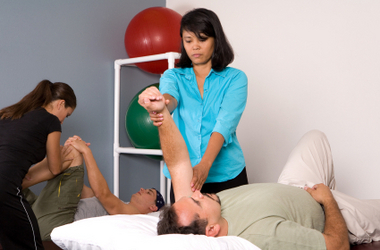When it comes to pinched nerve treatment options, you’ll have a good variety to choose from, based on the severity of your condition.
Pinched Nerve Treatment Options You Can Try
Pinched Nerve Treatment Option #1: Adequate Rest
The first line of treatment for a pinched nerve is rest. Adequate rest is often prescribed for people who exhibit early and minor pinched nerve symptoms, as it will easily curable in such a stage.
When you experience the typical symptoms of a pinched nerve, immediately stop using the affected part of the body and wait for the pain to subside. This should bring some temporary or permanent relief, depending on the progression of the condition.
Pinched Nerve Treatment Option #2: Medications
If taking ample rest does not work, consult a doctor who will prescribe painkiller medication to alleviate the pain. This is usually the second line of treatment that is administered.
In patients with severe inflammation, doctors may also prescribe corticosteroids for immediate relief.

Pinched Nerve Treatment Option #3: Physical Therapy
Some patients may require physical therapy or chiropractic treatment to remove the stiffness present in the affected region.
Often, this needs to be followed up with appropriate exercise to allow faster recovery. Splints and collars are sometimes necessary to provide support to areas that have been affected by weakness.
Pinched Nerve Treatment Option #4: Surgery
In cases where the nerve is too damaged, the doctor may recommend surgery to remove the bone, cartilage, or other parts that are placing pressure on the pinched nerve.
In order to fully understand the condition before evaluating your treatment options, you’ll have to learn about the risk factors of a pinched nerve.
What Are The Risk Factors For A Pinched Nerve?
Although it is possible for anyone to develop a pinched nerve due to a nerve injury, certain factors that have been mentioned below predispose individuals to this condition:
- Gender: Pinched nerve leading to carpal tunnel syndrome is thrice as more likely in women as compared to men.
- Excessive Strain: People who perform certain activities repeatedly (including movements of the wrist, hand, or shoulder) are more likely to suffer from a pinched nerve.
- Bone Spurs: These may result from a thickening of the bones in the spinal cord and put pressure on the adjoining nerve, leading to a pinched nerve.
- Poor Posture: Adopting a wrong posture while sitting, walking, standing, running, and sleeping can put pressure on the nerves and cause them to be compressed.
- Osteoarthritis and Rheumatoid Arthritis: People who suffer from these conditions are also likely to be affected by a pinched nerve.
Once you’re well aware of the condition and can spot the obvious symptoms your body is exhibiting, you can consult a physician to discuss your pinched nerve treatment options.